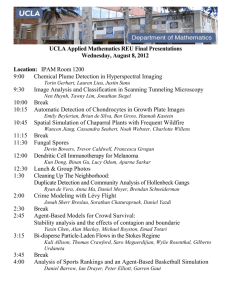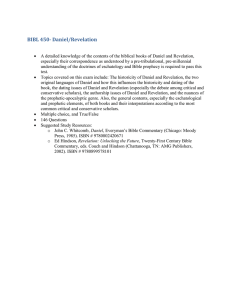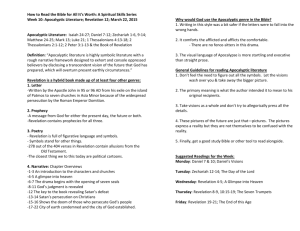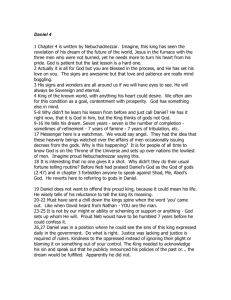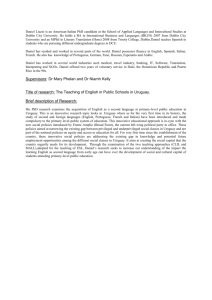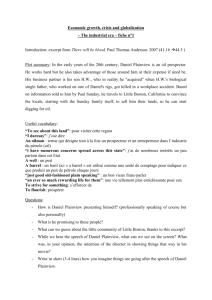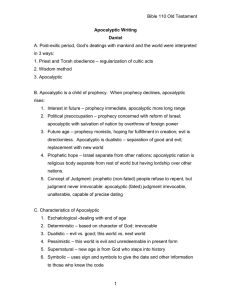Daniel
advertisement
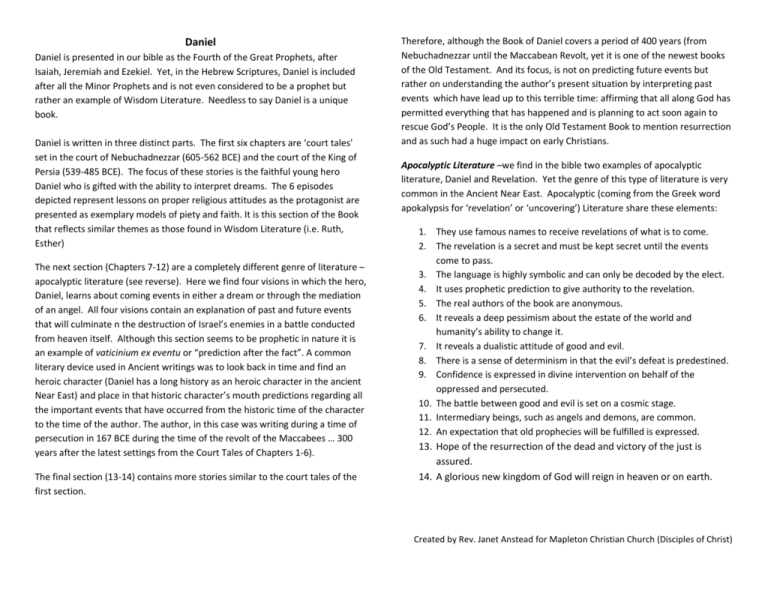
Daniel Daniel is presented in our bible as the Fourth of the Great Prophets, after Isaiah, Jeremiah and Ezekiel. Yet, in the Hebrew Scriptures, Daniel is included after all the Minor Prophets and is not even considered to be a prophet but rather an example of Wisdom Literature. Needless to say Daniel is a unique book. Daniel is written in three distinct parts. The first six chapters are ‘court tales’ set in the court of Nebuchadnezzar (605-562 BCE) and the court of the King of Persia (539-485 BCE). The focus of these stories is the faithful young hero Daniel who is gifted with the ability to interpret dreams. The 6 episodes depicted represent lessons on proper religious attitudes as the protagonist are presented as exemplary models of piety and faith. It is this section of the Book that reflects similar themes as those found in Wisdom Literature (i.e. Ruth, Esther) The next section (Chapters 7-12) are a completely different genre of literature – apocalyptic literature (see reverse). Here we find four visions in which the hero, Daniel, learns about coming events in either a dream or through the mediation of an angel. All four visions contain an explanation of past and future events that will culminate n the destruction of Israel’s enemies in a battle conducted from heaven itself. Although this section seems to be prophetic in nature it is an example of vaticinium ex eventu or “prediction after the fact”. A common literary device used in Ancient writings was to look back in time and find an heroic character (Daniel has a long history as an heroic character in the ancient Near East) and place in that historic character’s mouth predictions regarding all the important events that have occurred from the historic time of the character to the time of the author. The author, in this case was writing during a time of persecution in 167 BCE during the time of the revolt of the Maccabees … 300 years after the latest settings from the Court Tales of Chapters 1-6). The final section (13-14) contains more stories similar to the court tales of the first section. Therefore, although the Book of Daniel covers a period of 400 years (from Nebuchadnezzar until the Maccabean Revolt, yet it is one of the newest books of the Old Testament. And its focus, is not on predicting future events but rather on understanding the author’s present situation by interpreting past events which have lead up to this terrible time: affirming that all along God has permitted everything that has happened and is planning to act soon again to rescue God’s People. It is the only Old Testament Book to mention resurrection and as such had a huge impact on early Christians. Apocalyptic Literature –we find in the bible two examples of apocalyptic literature, Daniel and Revelation. Yet the genre of this type of literature is very common in the Ancient Near East. Apocalyptic (coming from the Greek word apokalypsis for ‘revelation’ or ‘uncovering’) Literature share these elements: 1. They use famous names to receive revelations of what is to come. 2. The revelation is a secret and must be kept secret until the events come to pass. 3. The language is highly symbolic and can only be decoded by the elect. 4. It uses prophetic prediction to give authority to the revelation. 5. The real authors of the book are anonymous. 6. It reveals a deep pessimism about the estate of the world and humanity’s ability to change it. 7. It reveals a dualistic attitude of good and evil. 8. There is a sense of determinism in that the evil’s defeat is predestined. 9. Confidence is expressed in divine intervention on behalf of the oppressed and persecuted. 10. The battle between good and evil is set on a cosmic stage. 11. Intermediary beings, such as angels and demons, are common. 12. An expectation that old prophecies will be fulfilled is expressed. 13. Hope of the resurrection of the dead and victory of the just is assured. 14. A glorious new kingdom of God will reign in heaven or on earth. Created by Rev. Janet Anstead for Mapleton Christian Church (Disciples of Christ)
